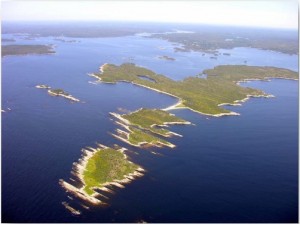The Nova Scotia Nature Trust has purchased Borgles Island, preventing a controversial development project which threatened to damage the island’s fragile ecology.
The Nova Scotia Nature Trust has this week acquired yet another island on its quest to preserve the future of Nova Scotia’s outstanding natural legacy through land conservation. Said to be the 60th conservation site since the group’s formation in 1994, the acquisition of Borgles Island is a particularly significant milestone for the nature trust.
Located within the Eastern Shore region of Nova Scotia, Borgles Island is located about 80 kilometres from Halifax and forms the province’s largest and most ecologically important coastal private island. The 214 hectare island forms home to a lake, a series of 10,000 year old forests, rare plants, and a rugged shoreline, dotted with white beaches.
Free of external influences until the Nature Trust first visited the site two years ago, Borgles Island presents a particularly interesting challenge to the NSNT’s scientists, who are already relishing the opportunity to discover unusual flora and fauna and investigate a diverse island eco-system within a protected environment.
Supported by the federal government and a series of private donors, the NSNT is reported to have paid CAD 1.1 million for the island and was spurred into action upon hearing that the Ship Harbour island was slated for development. The trust’s director, Bonnie Sutherland, said that this would have been a tragic loss to future generations of Nova Scotians.
“People didn’t realize that [Borgles Island] was privately owned and that someone had plans to do a major development out there that would have meant the loss of this very, very unique place and its biodiversity,” said Sutherland, who also went on to highlight the threat to the island’s public access.
Now open for exploration, the acquisition of Borgles Island will have far reaching consequences – not just for its natural inhabitants, but for the local community too. “There are incredible opportunities for learning, school programs and university research — we’re excited about that and that the wildlife of Borgle’s Island will have a safe refuge.”
Read more: http://globalnews.ca/video/924948/borgles-island-becomes-protected-area



